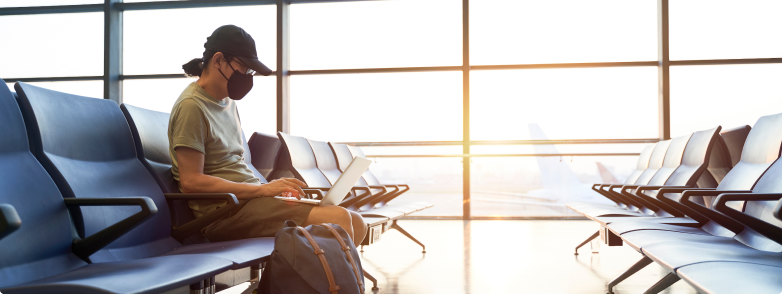With a few helpful travel tips, you'll be ready for your adventure.
Pack wisely: take care of your back and avoid carrying too much weight. Two lightweight luggage may be preferable to one hefty one. For the safety of the luggage handlers.
Prior to the travel, take care of yourself by getting a good night's sleep.
Dress appropriately : for the journey, wear comfy clothing.
Check the time: allow enough time to get through airport check-in, security, and immigration and passport control so you can relax and enjoy your travel.
Flight bookings are accepted up to 29 weeks of pregnancy, as long as there haven’t been any complications and medical concerns.
You'll need a medical certificate or letter signed by your doctor if you're traveling during or after your 29th week of pregnancy. Travelling on a flight may not be accepted without this medical certificate.
The certificate must have the following information:
- Confirmation of a singleton or multiple pregnancy
- No complications during pregnancy
- Estimated delivery date
- The latest date your doctor expects you to be fit to travel
- Confirmation of good health
It is forbidden to fly after the 36th week of pregnancy.
You must apply for medical clearance by completing a medical information form if you need to travel (MEDIF).
Unless it's for emergency medical treatment, your infant must be at least seven days old to fly. You'll need to fill out a medical information form if that's the case (MEDIF).
It's critical that you stay safe and comfortable throughout your travel. If you have a significant medical condition or require travel assistance, you may be required to fill out a MEDIF form.
Consult your doctor at least four to six weeks before your trip if you have diabetes, asthma, heart disease, epilepsy, or any chronic ailment.
Request a letter from your doctor outlining any medical concerns you may have as well as the standard treatments, including particular drugs and doses.
Make sure you have adequate medicine for your trip and keep it in your carry-on luggage. You should also check to see whether your prescription is restricted in your location and if you require special permission.
We won't be able to keep your medication cool, so bring a cool bag or a vacuum flask if necessary.
Maintain your vaccination records and have your immunization card with you at all times.
Make sure you have comprehensive insurance cover for international travel.
Here's a list of medical products you could require based on where you're travelling, as well as things to remember to bring with you on your trip. You can also carry a pharmacy-prepared kit with you.
- Your normal meds (remember to verify whether they are permitted in your destination and carry a note from your doctor)
- Vaccination certificate
- Travel Insurance with medical coverage
- Digital thermometer
- Analgesics (paracetamol, aspirin, ibuprofen)
- Antacids for indigestion, heartburn, or upset stomach
- Topical antiseptic/antibiotic
- Antihistamines for allergies
- Dressings and adhesive bandages
Translation is too long to be saved
Is it necessary to wear a mask during COVID-19?
You must wear a cloth or medical mask at all airports, during boarding, during your travel, and when exiting the plane. Children under the age of six and those with certain medical conditions are exempt from wearing masks.
You must submit a Medical Information Form (MEDIF) before your trip if you are unable to wear a mask for the duration of your voyage due to medical reasons.
Our cabin crew will be wearing masks as they welcome you on board and throughout the flight. When you're not eating or drinking, you should keep your mask on the whole flight.
All of our aircraft undergo a thorough cleaning and disinfection process prior to each voyage, and our lavatories are disinfected often throughout the flight.




